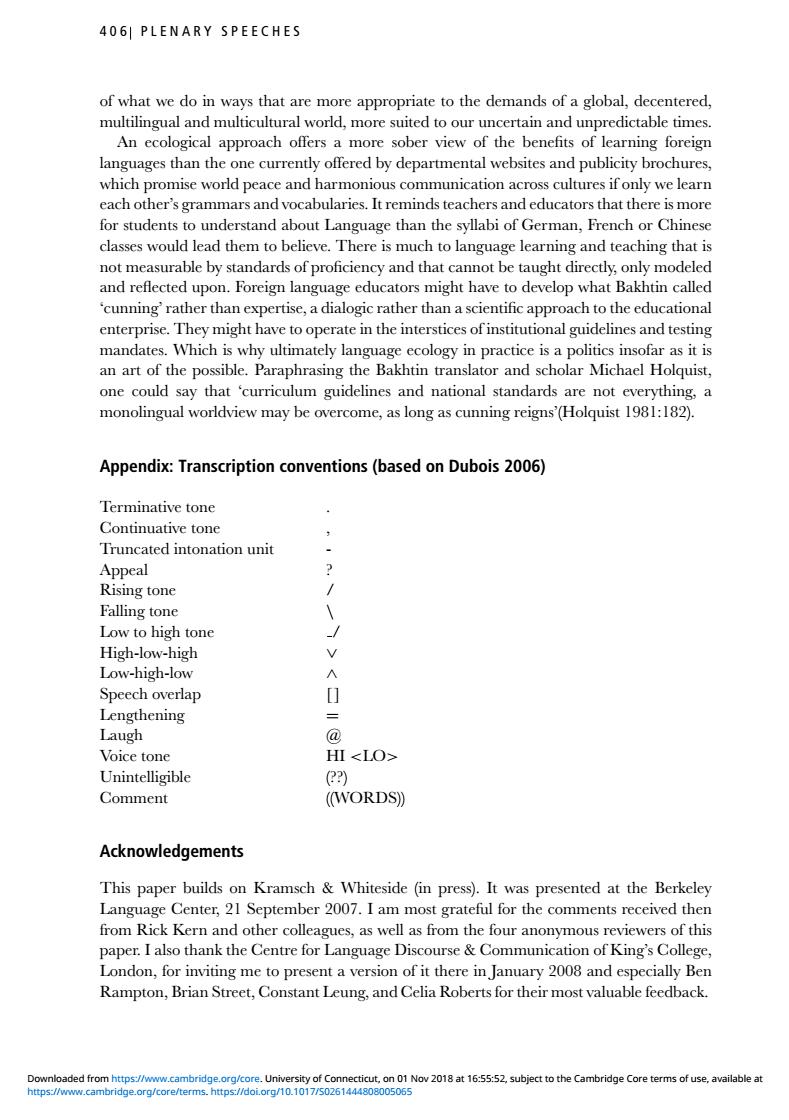正在加载图片...

406 PLENARY SPEECHES of what we do in ways that are more appropriate to the demands of a global,decentered, multilingual and multicultural world.more suited to our uncertain and unpredictable times languages than the one currenth offered by departmental websites and publicity brochures which promise world peace and harmonious communication across cultures if only we learn each other's grammars and vocabularies.It reminds teachers and educators that there is more for students to understand about Language than the syllabi of German,French or Chinese classes would lead them to believe.There is much to language learning and teaching that is not ndards of proficie cy and that inot be ught dir 11J and reflected upon.Foreign language educators might have to develop what Bakhtin called cunning'rather than expertise,a dialogic rather than a scientific approach to the educational enterprise.They might have to operate in the interstices of institutional guidelines and testing mandates.Which is why ultimately language ecology in practice is a politics insofar as it is an art of the possible.Paraphrasing the Bakhtin translator and scholar Michael Holquist one could say that 'curriculum guidelines and national standards are not monolinal worldview may be overcome.ong cumnnr (Holauist 19 Appendix:Transcription conventions(based on Dubois 2006) Terminative tone Continuative tone Truncated intonation unit Appeal Rising tone Falling ton Low to high ton High-low-high Low-high-low A Speech overlap ngthening Laugh Voice tone HI <LOz Unintelligible 02 Comment ((WORDS)) Acknowledgements This paper builds on Kramsch&Whiteside (in press).It was presented at the Berkeley Language Center,21 September 2007.I am most grateful for the comments received then from Rick Kern and other colleagues,as well as from the four anonymous reviewers of this paper.I also thank the Centre for Language Discourse Communication of King's College, London,for me topresent ave rsion of it there in lanuary 2008 and especially ben Rampton,Brian Street,Constant Leung,and Celia Roberts for their most valuable feedback :5,subject to the Cambridge Core terms of use.406 PLENARY SPEECHES of what we do in ways that are more appropriate to the demands of a global, decentered, multilingual and multicultural world, more suited to our uncertain and unpredictable times. An ecological approach offers a more sober view of the benefits of learning foreign languages than the one currently offered by departmental websites and publicity brochures, which promise world peace and harmonious communication across cultures if only we learn each other’s grammars and vocabularies. It reminds teachers and educators that there is more for students to understand about Language than the syllabi of German, French or Chinese classes would lead them to believe. There is much to language learning and teaching that is not measurable by standards of proficiency and that cannot be taught directly, only modeled and reflected upon. Foreign language educators might have to develop what Bakhtin called ‘cunning’ rather than expertise, a dialogic rather than a scientific approach to the educational enterprise. They might have to operate in the interstices of institutional guidelines and testing mandates. Which is why ultimately language ecology in practice is a politics insofar as it is an art of the possible. Paraphrasing the Bakhtin translator and scholar Michael Holquist, one could say that ‘curriculum guidelines and national standards are not everything, a monolingual worldview may be overcome, as long as cunning reigns’(Holquist 1981:182). Appendix: Transcription conventions (based on Dubois 2006) Terminative tone . Continuative tone , Truncated intonation unit - Appeal ? Rising tone / Falling tone \ Low to high tone / High-low-high ∨ Low-high-low ∧ Speech overlap [ ] Lengthening = Laugh @ Voice tone HI <LO> Unintelligible (??) Comment ((WORDS)) Acknowledgements This paper builds on Kramsch & Whiteside (in press). It was presented at the Berkeley Language Center, 21 September 2007. I am most grateful for the comments received then from Rick Kern and other colleagues, as well as from the four anonymous reviewers of this paper. I also thank the Centre for Language Discourse & Communication of King’s College, London, for inviting me to present a version of it there in January 2008 and especially Ben Rampton, Brian Street, Constant Leung, and Celia Roberts for their most valuable feedback. https://www.cambridge.org/core/terms. https://doi.org/10.1017/S0261444808005065 Downloaded from https://www.cambridge.org/core. University of Connecticut, on 01 Nov 2018 at 16:55:52, subject to the Cambridge Core terms of use, available at